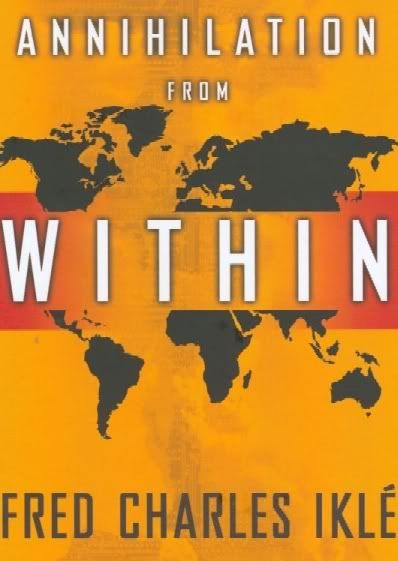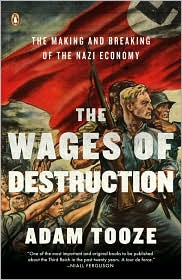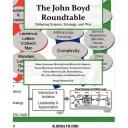Recommended…Reads.
Need a last minute gift idea for….yourself? Some highly recommended books that I’ve perused in the past year or so:
Great Powers: America and the World After Bush by Thomas P.M. Barnett
Having read an advanced copy, this is easily Tom’s best work, surpassing his bestselling The Pentagon’s New Map in sweep and historical depth. A book with a provocative analysis that is definitely going to challenge the comfortable assumptions of the defense and foreign policy establishments and enrage not a few partisans. I will have a full review in mid-January after I see the “final edit” version.
Caesar: Life of a Colossus by Adrian Goldsworthy
Goldsworthy, a British military historian, gives Julius Caesar the same comprehensive and magisterial treatment that Alan Schom rendered with his landmark biography of Napoleon (Napoleon Bonaparte, incidentally, was an admirer of Hannibal, not Caesar) A biography and work of military history that is a page turner.
The Wages of Destruction: The Making and Breaking of the Nazi Economy by Adam Tooze
Dan from Madison at Chicago Boyz has reviewed Wages of Destruction, which led me to pick up a copy recently and start reading. Like Niall Ferguson, Tooze puts economic history into a dramatic explanatory context. If you have doubts, pick up a copy and flip to the chapter entitled “The Grand Strategy of Racial War” and read. You’ll walk out of the store with it.
The John Boyd Roundtable: Debating Science, Strategy, and War by Mark Safranski, Daniel Abbott, Chet Richards, Shane Deichman, Thomas Wade, Frans Osinga, Adam Elkus and Frank Hoffman. Foreword by Thomas P.M. Barnett
A refinement and extension of the online roundtable at Chicago Boyz dedicated to reviewing Science, Strategy and War by Col. Frans Osinga (see below) and debating the ideas of the late strategic theorist Colonel John Boyd. Great for both the “Boyd expert” and those wanting a quick primer before tackling Osinga’s monumental work of strategic studies and intellectual history [ Full Disclosure: for newer readers who may not be aware, I was the editor and I’m shamelessly self-promoting here 🙂 ]
Science, Strategy and War: The Strategic Theory of John Boyd (Strategy and History) by Frans Osinga
Dr.Osinga has delivered a meticulously researched tome that William Lind called “the book Boyd would have written” that explains Colonel John Boyd as “the first postmodern strategist”. Osinga walks the reader through Boyd’s intellectual journey into fields as far removed from classical military studies as cybernetics, knowledge theory and the work of mathematician Kurt Godel and explains how Boyd distilled a strategic worldview on the nature of conflict and competition.



The Culture of War by Martin van Creveld
Eminent and controversial Dutch-Israeli military historian Martin van Creveld expands upon his body of work that is often described as “prophetic” these days in order to argue the intrinsic cultural value of war.
The Black Swan: The Impact of the Highly Improbable by Nassim Nicholas Taleb
This was the “must read” book of the blogosphere in 2007- 2008, widely cited (though perhaps first by John Robb) for the Black Swan concept itself. Taleb is an idiosyncratic, wide-ranging, writer interested in counterintuitive perspectives and is deeply skeptical of the validity of existing epistemological methodologies. Parts of the book will be of interest only to those with advanced backgrounds in probabalistic analysis and mathematics but there is much else that is intriguing and entertaining along the way while Taleb explains the characteristics of Extremistan and Mediocristan. A friend who moves among quite a few “thought leaders” described Taleb to me as “arrogant” but with something of value to say. Agreed.
On War (Oxford World’s Classics) by Carl von Clausewitz
Pick up a copy and join us during the Clausewitz Roundtable in January!!
Annihilation from Within: The Ultimate Threat to Nations by Fred C. Ikle
Ikle, a senior Defense Department official in the Reagan administration tackles apocalyptic threat scenarios including the one coming from our own best efforts to avoid them. A gloomy but thought-provoking read.
The Cold War: A New History by John Lewis Gaddis
Gaddis intended to write a book for the college undergraduate or layman that concisely explains the Cold War and the “why ?” of the victory of the West and generally does a superb job of it. The undercurrent or background that may not be obvious to the layman is that Gaddis is sticking a thumb in the collective eye of the revisionist diplomatic historians of the New Left – notably Walter LaFeber, Lloyd Gardner, Gabriel Kolko and Robert Buzzanco and others descending at least vaguely from the school of thought founded by William Appleman Williams.
Stalin: The Court of the Red Tsar by Simon Sebag Montefiore
A brilliant example of Soviet studies scholarship. I’ve read innumerable books on Stalin and the USSR and I still learned things from Montefiore. Highly recommended.
The Third Reich in Power, 1933-1939 by Richard J. Evans
The second book in his trilogy on the history of Nazism, Evans looks at the Nazi state and party apparatus and German society during the years of peace. Evans, along with Michael Burleigh, Ian Kershaw and Adam Tooze are revising our understanding of the Third Reich and illuminating that as evil as Hitler’s regime was in fact, it ultimately was intended to be several orders of magnitude worse had Germany won the Second World War.
Nixon and Kissinger: Partners in Power by Robert Dallek
A deeply partisan work of history, Dallek makes little effort to be fair (especially in the first half of the text) to either Richard Nixon or Henry Kissinger, both whom he characterizes as mentally and emotionally unstable, if highly intelligent, personalities and makes an argument that Nixon’s mental state during the Watergate crisis required his removal from office under the 25th amendment. It’s difficult to imagine Dallek treating Bill Clinton or LBJ in similar fashion, regardless of their personal behavior or abuses of power because seldom does Nixon ever get the benefit of the doubt ( in comparison Richard Reeves’ devastating profile, Nixon: Alone in the White House is a work of hagiography).
Why read Nixon and Kissinger then ? Because Dallek, despite his biases, has done an outstanding job in presenting new sources and evidence and his delving into the China Opening and Nixon and Kissinger’s very complicated personal relationship, remains a first-rate work of scholarship. Therefore, I say “Read it” ( just do not let it be the only book you read on Richard Nixon).
That’s it!













December 21st, 2008 at 11:32 am
Glad I got you to read that Tooze book, it was the best one I read this year.
December 21st, 2008 at 4:37 pm
I am finding reading time to be brutally scarce. I read the first 1/4 of Tooze, and it is excellent and I will finish it.
.
Agreed that Tom Barnett’s new book is his best one so far. Very much worth reading, and it will provoke productive (I hope) disagreement in places.
.
Osinga is brilliant, but dense. It also really needs to be issued at a lower price. Too few people will read it at the price it is going for. I was only able to give it a very fast read, and it demands more.
.
The roundtable held up well when transferred to book form. If one must read one book on Boyd, I’d say it is Coram’s bio.
.
The rest of these are all on my list … . A long list, more than one lifetime’s worth … .
December 21st, 2008 at 5:36 pm
hi Dan,
.
It’s very good. Hard to do good econ history well so it’s a double plus effort. BTW Caught your post on getting a therapeutic massage -LOL! the numbness created by years of Muay Thai is all scar tissue impeding nerves – which deep tissue massage breaks up – that had to really hurt like all hell !
.
hi Lex,
.
I think Frans really was given a bad deal by his publisher – the hardcover was was very expensive even by academic library budget standards – but then professional academics, even military ones, are not publishing for sales per se but prestige and the publisher matters as much as sales. A few thousand copies by Harvard or U. of Chicago press matters more than 100,000 copies at Random House.
.
After reviewing the books I’ve read this year, a far longer list than what’s here , I’ve decided that I need to get more science-related books under my belt in 2009. This past year was very heavy on military and ancient history – all good but my mind will benefit from a change-up.
December 22nd, 2008 at 1:56 am
"A few thousand copies by Harvard or U. of Chicago press matters more than 100,000 copies at Random House."
How many would he sell with a second edition on Nimble (half+ seriously asked).
December 23rd, 2008 at 1:08 pm
Zen – well, the massage was pretty excruciating on my legs (I was wimpering like a little baby) but did wonders on my upper back, arms, and neck. I was amazed at how totally messed up my thighs were. I expected pain and all sorts of mayhem in my calves and lower legs since they are used so much for kicking and blocking, but my thighs were totally packed wtih lactic acid and I didn’t even know it. I guess after a while you just get used to it. Then again, this was just after a long test and some very heavy sparring, so maybe I had a little extra trauma in my legs from that. I do remember getting kneed a few times in the thighs during the sparring portion of my last test. It really smarts. I can’t wait to get back there for more, probably on Monday. Highly recommended if you have the extra jack laying around.